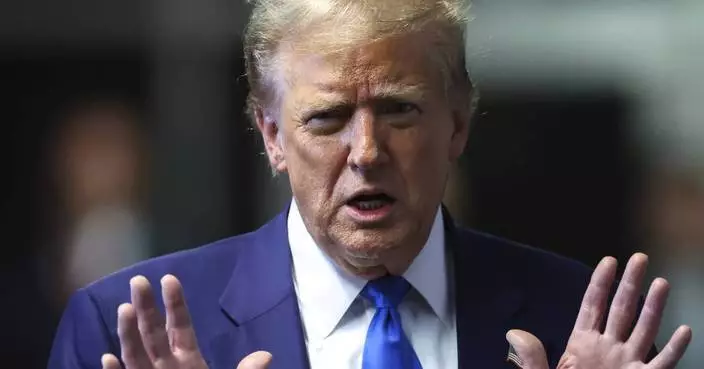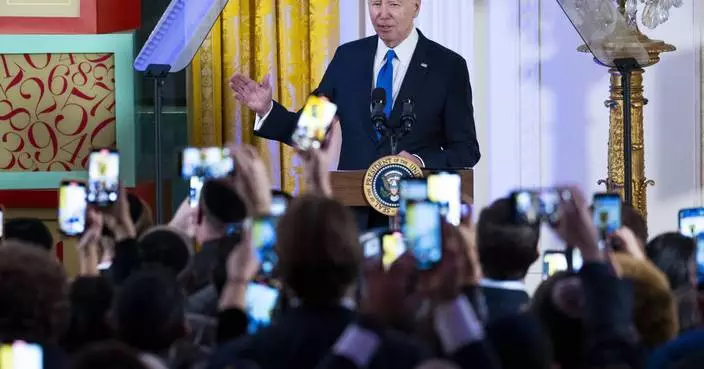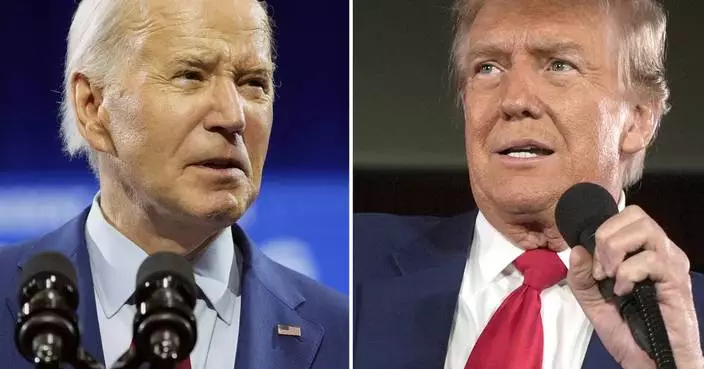The United States attacked first, imposing tariffs on steel and aluminum from around the globe and threatening to hit tens of billions of dollars in Chinese products.

FILE - In this Sept. 12, 2017 file photo Daimler CEO Dieter Zetsche speaks at a Mercedes press conference on the first media day of the International Frankfurt Motor Show IAA in Frankfurt, Germany. (AP Photo/Michael Probst, file )
Now, the world is punching back.
The European Union is set Friday to slap tariffs on $3.4 billion in American products, from whiskey and motorcycles to peanuts and cranberries. India and Turkey have already targeted U.S. products, ranging from rice to autos to sunscreen.
And the highest-stakes fight still looms: In two weeks, the United States is to start taxing $34 billion in Chinese goods. Beijing has vowed to immediately retaliate with its own tariffs on U.S. soybeans and other farm products in a direct shot at President Donald Trump's supporters in America's heartland.
The tit-for-tat conflict between the United States and China — the world's two largest economies — is poised to escalate from there. The rhetoric is already intensifying.
"We oppose the act of extreme pressure and blackmail by swinging the big stick of trade protectionism," a spokesman for China's Commerce Ministry said Thursday. "The U.S. is abusing the tariff methods and starting trade wars all around the world."
Cecilia Malmstrom, the EU's trade commissioner, acknowledged that the EU had targeted some iconic American imports for tariffs, like Harley-Davidson motorcycles and bourbon, to "make noise" and put pressure on U.S. leaders.
John Murphy, a senior vice president at the U.S. Chamber of Commerce, estimates that $75 billion in U.S. products will be subject to new foreign tariffs by the end of the first week of July.
"We've never seen anything like this," said Mary Lovely, a Syracuse University economist who studies international trade — at least not since countries tried to wall themselves off from foreign competition during the Great Depression.
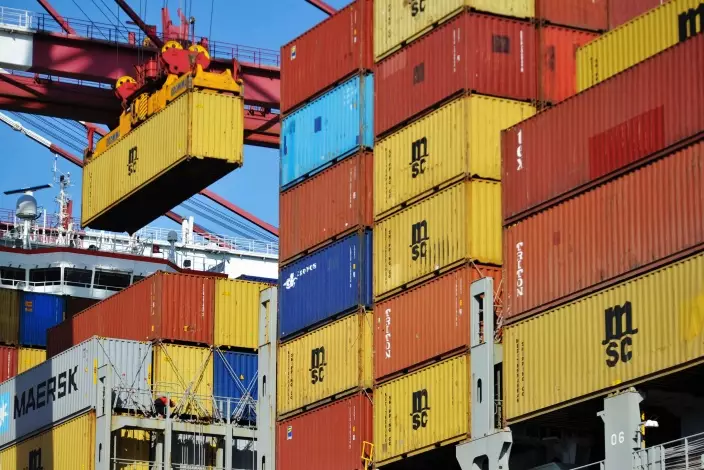
FILE - In this April 8, 2018 file photo,a container is loaded onto a cargo ship at a port in Qingdao in east China's Shandong province, Sunday, April 8, 2018. (Chinatopix via AP)
Those personally in the line of fire are among the most concerned.
"It will be a disaster," said Nagesh Balusu, manager of the Salt Whisky Bar and Dining Room in London and expects the European Union's tariffs to add more than $7 to the price of a bottle of Jack Daniels, which is imported from Tennessee. "It's going to hit customers, that's for sure. How they'll take it, we'll have to wait and see."
As painful as the brewing trade war could prove, many have seen it coming.
Trump ran for the presidency on a vow to topple seven decades of American policy that had favored ever-freer trade among nations. He charged that a succession of poorly negotiated accords — including the North American Free Trade Agreement and the pact that admitted China into the World Trade Organization — put American manufacturers at an unfair disadvantage and destroyed millions of U.S. factory jobs.
He pledged to impose tariffs on imports from countries that Trump said had exploited the United States. Late last month, Trump proceeded to infuriate U.S. allies — from the EU to Canada and Mexico by imposing tariffs of 25 percent on imported steel and 10 percent on aluminum. The president justified the move by saying imported metals threatened America's national security — a dubious justification that countries have used rarely because it can be so easily abused.
And he is threatening to impose another national security-based tariff on imports of cars, trucks and auto parts.
Trump has also started a trade fight with China over Beijing's sharp-elbowed efforts to overtake U.S. technological dominance. China's tactics range from forcing American companies to hand over technology in exchange for access to the Chinese market to outright cyber-theft.
The White House last week announced plans to slap 25 percent tariffs on 1,100 Chinese goods, worth $50 billion in imports. Trump would start July 6 by taxing $34 billion worth of products and later add tariffs on an additional $16 billion in goods.
The Chinese have said they will respond in kind. Trump said he would then retaliate against any counterpunch from Beijing by targeting an additional $200 billion in Chinese products, and then yet another $200 billion if China refused to back down. All told, the $450 billion in potential tariffs would cover nearly 90 percent of goods China sends to the United States.
The tariffs and threats have begun to take a toll. Steel and aluminum prices, for example, have shot up and supplies have become scarce.
"Steel pricing is usually relatively stable," said Al Rheinnecker, CEO of American Piping Products in Chesterfield, Missouri, which distributes steel pipe to numerous industries. But "since April, you can quote something on Monday, and if the customer doesn't buy it right away, you may have to raise the price on Thursday."
So far, Rheinnecker has managed to pass along the higher costs to his customers. He's not sure how long that will last.
The Commerce Department is allowing companies to request exemptions from the steel and aluminum tariffs — if they can show that the metals they need aren't available from Americans producers. The department expected 4,500 requests. But it's been overwhelmed by more than 20,000. This week, it said it has processed just 98 requests so far, approving 42 and denying 56.
The rising tensions and the chaos surrounding the steel and aluminum tariffs are starting to generate pushback on Capitol Hill. Senators this week grilled Commerce Secretary Wilbur Ross.
"As you consider these tariffs, know that you are taxing American families, you are putting American jobs at risk, and you are destroying markets — both foreign and domestic — for American businesses of all types, sorts and sizes," said Senate Finance Chairman Orrin Hatch, R-Utah.
Economists and trade analysts worry that there may be no way out of an all-out trade war between the United States and its most vital trading partners.
"The president has been so belligerent that it becomes almost impossible for democratically elected leaders — or even a non-democratic leader like (Chinese president) Xi Jinping — to appear to kowtow and give in," said Philip Levy, senior fellow at the Chicago Council on Global Affairs and a former White House trade adviser. "The president has made it very hard for other countries to give him what he wants."
FORT LAUDERDALE, Fla. (AP) — Brad Parscale was the digital guru behind Donald Trump's surprise victory in the 2016 election and was promoted to manage the 2020 campaign. But he didn't last long on that job: His personal life unraveled in public and he later texted a friend that he felt “guilty” for helping Trump win after the riot at the U.S. Capitol.
He's since become an evangelist about the power of artificial intelligence to transform how Republicans run political campaigns. And his company is working for Trump's 2024 bid, trying to help the presumptive Republican nominee take back the White House from Democratic President Joe Biden.
Here's what to know about Parscale and his new role:
Parscale says his company, Campaign Nucleus, can use AI to help generate customized emails, parse oceans of data to gauge voter sentiment and find persuadable voters. It can also amplify the social media posts of “anti-woke” influencers, according to an Associated Press review of Parscale’s public statements, his company documents, slide decks, marketing materials and other records not previously made public.
Soon, Parscale says, his company will deploy an app that harnesses AI to assist campaigns in collecting absentee ballots in the same way drivers for DoorDash or Grubhub pick up dinners from restaurants and deliver them to customers.
Parscale was a relatively unknown web designer in San Antonio, Texas, when he was hired to build a web presence for Trump's family business.
That led to a job on the future president’s 2016 campaign. He was one of its first hires and spearheaded an unorthodox digital strategy, teaming up with scandal-plagued Cambridge Analytica to help propel Trump to the White House.
“I pretty much used Facebook to get Trump elected in 2016,” Parscale said in a 2022 podcast interview.
Following Trump’s surprise win, Parscale’s influence grew. He was promoted to manage Trump's reelection bid and enjoyed celebrity status. A towering figure at 6 feet, 8 inches with a Viking-style beard, Parscale was frequently spotted at campaign rallies taking selfies with Trump supporters and signing autographs.
Parscale was replaced as campaign manager not long after a rally in Tulsa, Oklahoma, drew an unexpectedly small crowd, enraging Trump.
Since last year, Campaign Nucleus and other Parscale-linked companies have been paid more than $2.2 million by the Trump campaign, the Republican National Committee and their related political action and fundraising committees, campaign finance records show.
Parscale did not respond to questions from the AP about what he’s doing for the Trump campaign. Trump has called artificial intelligence “so scary” and “dangerous,” while his campaign, which has shied away from highlighting Parscale’s role, said in an emailed statement that it did not “engage or utilize” tools supplied by any AI company.
Parscale-linked companies have been paid to host websites, send emails, provide fundraising software and digital consulting, campaign finance records show.
The Biden campaign and Democrats are also also using AI. So far, they said they are primarily deploying the technology to help them find and motivate voters and to better identify and overcome deceptive content.
Last year, Parscale bought property in Midland, Texas, in the heart of the nation’s highest-producing oil and gas fields. It is also the hometown of Tim Dunn, a billionaire born-again evangelical who is among the state’s most influential political donors.
In April of last year, Dunn invested $5 million in a company called AiAdvertising that once bought one of Parscale’s firms under a previous corporate name. The San Antonio-based ad firm also announced that Parscale was joining as a strategic adviser, to be paid $120,000 in stock and a monthly salary of $10,000.
“Boom!” Parscale tweeted. “(AiAdvertising) finally automated the full stake of technologies used in the 2016 election that changed the world.”
AiAdvertising added two key national figures to its board: Texas investor Thomas Hicks Jr. — former co-chair of the RNC and longtime hunting buddy of Donald Trump Jr. — and former GOP congressman Jim Renacci. In January, Dunn gave AiAdvertising an additional $2.5 million via an invesment company, and AiAdvertising said in a news release that the cash infusion would help it “generate more engaging, higher-impact campaigns.”
Dunn declined to comment, and AiAdvertising did not respond to messages seeking comment.
Parscale occasionally offers glimpses of the AI future he envisions. Casting himself as an outsider to the Republican establishment, he has said he sees AI as a way to undercut elite Washington consultants, whom he described as political parasites.
In January, Parscale told a crowd assembled at a grassroots Christian event in a Pasadena, California, church that their movement needed “to have our own AI, from creative large language models and creative imagery, we need to reach our own audiences with our own distribution, our own email systems, our own texting systems, our own ability to place TV ads, and lastly we need to have our own influencers.”
—-
Burke reported from San Francisco. AP National Political Writer Steve Peoples in Washington and Associated Press researcher Rhonda Shafner in New York contributed to this report.
—-
This story is part of an Associated Press series, “The AI Campaign,” that explores the influence of artificial intelligence in the 2024 election cycle.
—-
Contact AP’s global investigative team at Investigative@ap.org or https://www.ap.org/tips/
—-
The Associated Press receives financial assistance from the Omidyar Network to support coverage of artificial intelligence and its impact on society. AP is solely responsible for all content. Find AP’s standards for working with philanthropies, a list of supporters and funded coverage areas at AP.org
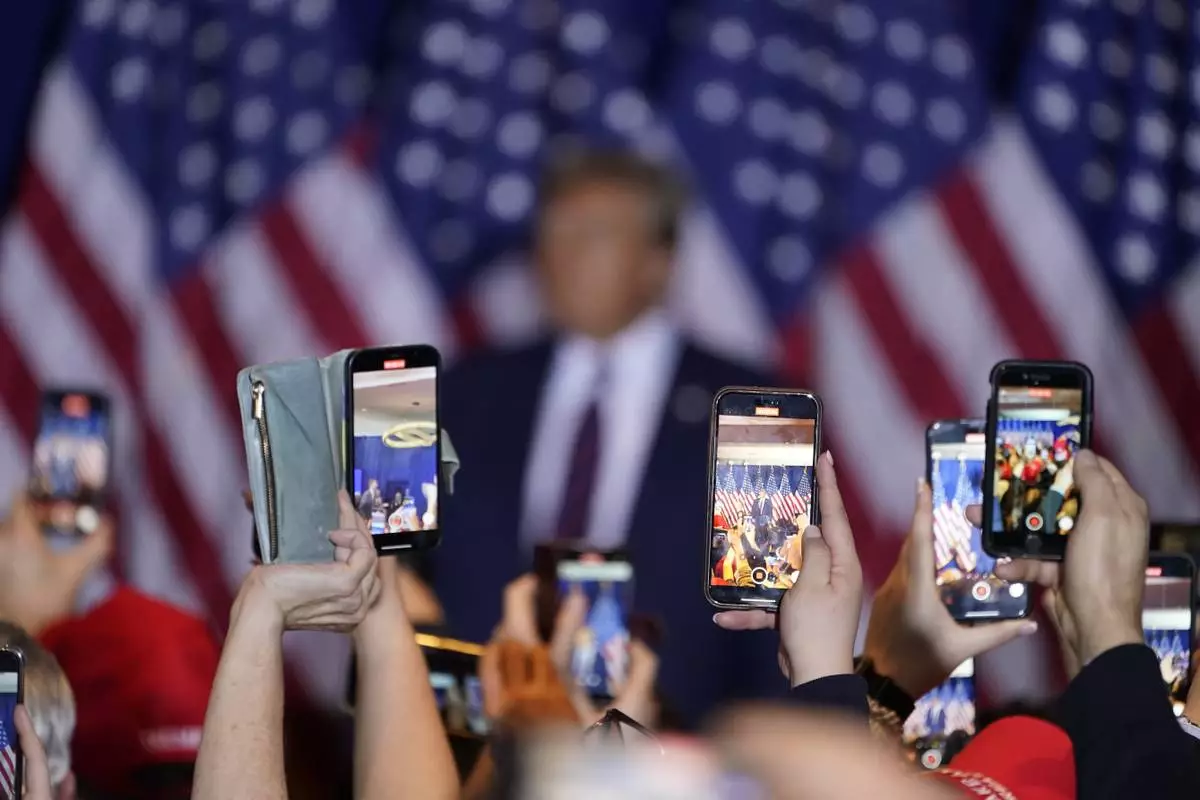
FILE - Republican presidential candidate former President Donald Trump speaks at an election night rally on primary election night in Nashua, N.H., Tuesday, Jan. 23, 2024. Election experts say they are concerned about AI’s potential to upend elections around the world through convincing deepfakes and other content that could mislead voters. (AP Photo/David Goldman, File)

Pages from the Campaign Nucleus website are seen on a computer in New York on Thursday, May 2, 2024. Political consultant Brad Parscale’s company, Campaign Nucleus, is boosting fundraising and voter engagement for the Trump campaign and other right-wing causes by leveraging data science to automate how political operatives identify and motivate their supporters. (AP Photo/Patrick Sison)
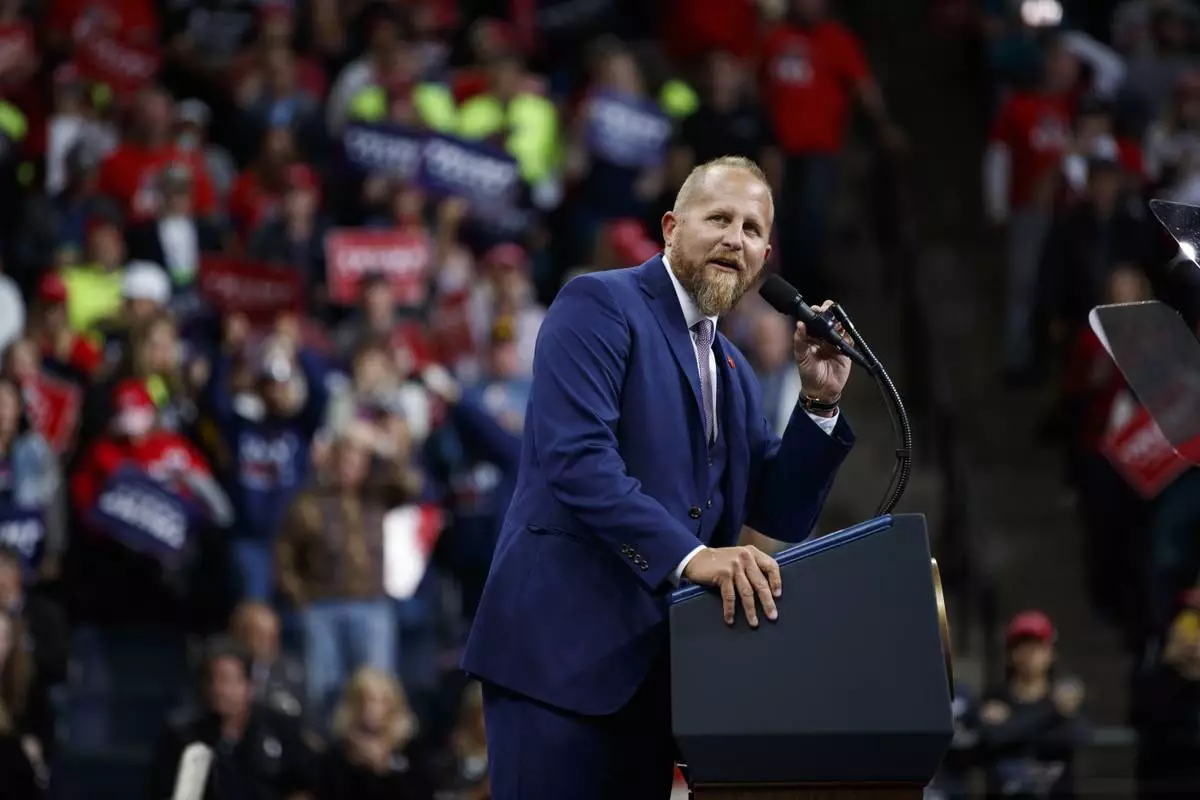
FILE - Brad Parscale, then-campaign manager for President Donald Trump, speaks during a campaign rally at the Target Center in Minneapolis, Oct. 10, 2019. Parscale, the digital campaign operative who helped engineer Trump’s 2016 presidential victory, vows that his new, AI-powered platform will dramatically overhaul not just polling, but also campaigning. (AP Photo/Evan Vucci, File)








